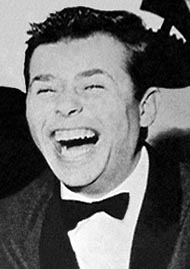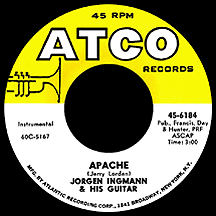JORGEN INGMANN
Apache
A 1954 western film starring Burt Lancaster provided the inspiration for a song that would become a major hit in several countries by several different artists...and much more. Apache, an early directorial effort by Robert Aldrich (best known for "The Dirty Dozen") with Lancaster portraying the part of Massai, the last of the mighty Apache warriors, was a favorite of Jerry Lordan, who used the movie's title for a song he wrote six years later.
Underrated rock guitarist Bert Weedon had several hit singles in England between 1959 and '61. His was the first recorded version of "Apache," but it was The Shadows who scored a big hit with the song. Having backed Cliff Richard on his string of hits starting in 1958 (calling themselves The Drifters until they realized there was an American R&B group by that name), the band decided on a side career recording instrumentals, resulting in a successful run beyond their wildest expectations. "Apache" was the first release, a U.K. number one smash in August and September 1960, the first of more than two dozen hit singles. After their version took off, Weedon's was released and made a respectable top 40 showing.
Cover versions started popping up around the globe, and the version that hit big in America wasn't by Weedon or the Shadows, nor even by a U.S. act. Guitarist Jorgen Ingmann of Copenhagen, Denmark slipped across the Atlantic to orchestrate the coup. Ingmann had performed for a time with fellow countryman Svend Asmussen (nicknamed "The Fiddling Viking"), a jazz violinist who ranks among the most successful Danish acts in history. His group The Swe-Danes mastered the art of vocalese scat singing (using no lyrics, but vowels and syllables in an impressive form of vocal acrobatics). In 1960 the trio, which featured Asmussen, Alice Babs and Ulrik Neumann, had a minor U.S. chart single (and bigger international hit), "Scandinavian Shuffle," spotlighting their tongue-twisting talents.
Ingmann, a fan and student of the groundbreaking techniques of Les Paul, held some of his own "mad scientist" experiments in multitracking. Like Paul, he built a home studio for the purpose of recording himself on overlaying guitar, bass, drums and other instruments. The resultant recording of "Apache" was a magnificent yet oddly intimate sound for a one-man production. Released in the U.S. on the Atco label at the end of 1960, it climbed to number two on the national charts in April '61. The overdubbed guitars and reverb sounded like nothing else on the radio...and that includes any previous version of the song.

A vocal version by country star Sonny James, with added lyrics by Houston singer-songwriter Johnny Flamingo, appeared at about the time Jorgen's version was peaking. One has to wonder how the entire music industry might have changed had the Shadows broken the song in America instead of Ingmann; imagine the British Invasion starting in 1961 with "Shadowmania," possibly sidetracking the kind of mania we actually experienced in '64! The group, however, never made an appearance on the U.S. charts despite ongoing attempts by the ABC-Paramount, Atlantic and Epic labels in the early-to-mid-'60s. Ingmann, however, hit the charts again in May '61 with a remake of Italian movie star Silvana Mangano's top ten hit from 1953, "Anna" (its flip side the inevitably-titled "Cherokee"). He clawed his way onto the U.S. charts in early '63 as a songwriter, collaborating with Bert Graves on "Chicken Feed," a piano-peckin' barnyard instrumental performed by fellow Dane Bent Fabric.
Chalk up another triumphant moment in said artist's career: Jorgen and his wife Grethe (she the singer and he the guitar wizard), after winning the Dansk Melodi Grand Prix in 1963, moved on to represent Denmark in the eighth annual Eurovision Contest. Their performance of "Dansevise" ("Dance Ballad"), broadcast live on the U.K.'s BBC (the host country for the event that year), won the top prize, the first of just two Eurovision victories for Denmark throughout the competition's long history. Grethe and Jorgen Ingmann performed together off and on until their divorce in 1975 after 20 years of marriage.
"Apache," it turns out, has had a life far beyond those early renditions of Jerry Lordan's now-classic tune. It was the first of four chart singles for Davie Allan and the Arrows in 1965. Studio group The Incredible Bongo Band released a version in 1973 that, while not a hit, has been sampled by countless hiphop and pop acts on singles and albums large and small. Rap group The Sugarhill Gang brought the song back into hit territory in 1982. Somewhere, no doubt, someone's performing and/or sampling the song as I write this. Burt Lancaster surely had no idea, when he first donned warpaint that day in the desert back in '54, that he'd just started rolling an ever-expanding snowball.


